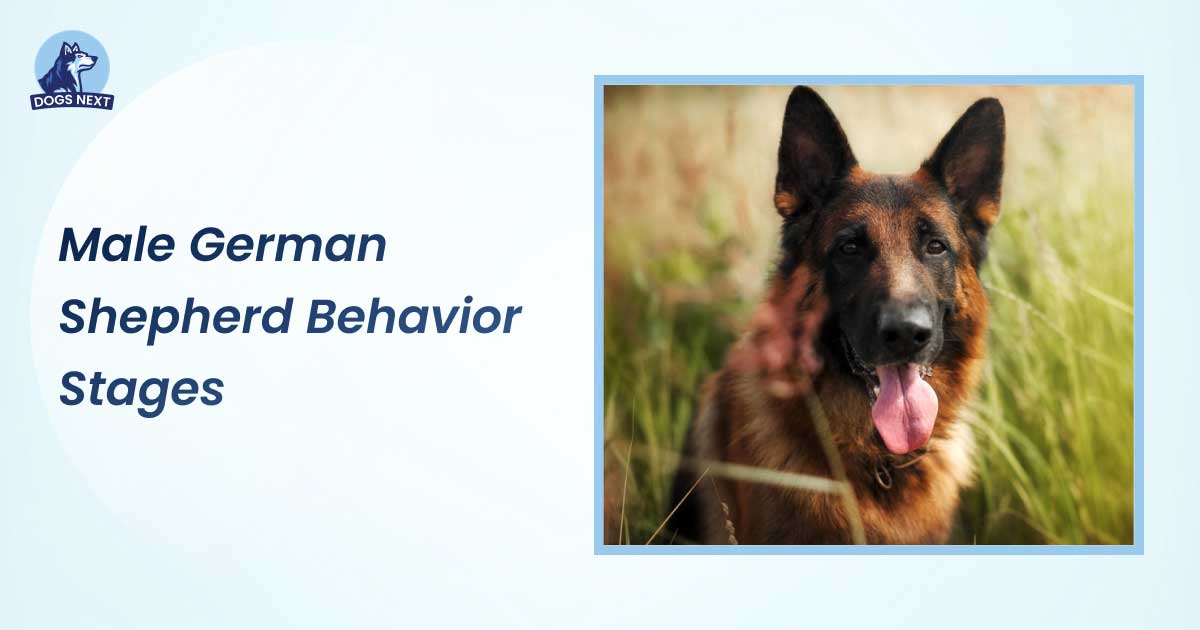Male German Shepherds experience distinct behavior stages: puppy, adolescence, adulthood, and seniority. Each stage presents unique challenges and characteristics that owners should understand.
Understanding the behavior stages of male German Shepherds is crucial for effective training and bonding. From playful puppies to mature adults, each phase has specific needs and traits. During the puppy stage, socialization and basic training are essential for development.
Adolescence brings increased energy and testing of boundaries, requiring patience and consistency. As they enter adulthood, male German Shepherds often exhibit confidence and loyalty. In their senior years, they may slow down, needing more care and attention. Familiarity with these stages helps owners provide the right support, ensuring a happy and healthy life for their dogs.
Puppy Stage (0-6 Months)
The Puppy Stage (0-6 months) is a crucial time for male German Shepherds. This stage shapes their future behavior and personality. Puppies are full of energy and curiosity. They explore the world with their noses and paws. It’s essential to guide them properly during this time. Proper training and socialization can lead to a well-behaved adult dog.
Playfulness And Socialization
Playfulness is a major trait of male German Shepherd puppies. They love to romp around and explore. This stage is also about learning how to interact with other dogs and people. Socialization is vital to ensure they grow up friendly and confident. Here are some key points:
- Puppies should meet various people and pets.
- Playtime helps them learn bite inhibition.
- Group classes can boost social skills.
Creating a friendly environment can help your puppy. Here’s a simple table highlighting playtime activities:
| Activity | Benefits |
| Fetch | Improves physical fitness |
| Agility games | Enhances coordination and confidence |
| Social playdates | Encourages interaction with other dogs |
Always supervise playtime. This prevents accidents and teaches appropriate behavior. Encourage gentle play to foster good manners.
Basic Training And Bonding
Basic training is essential for male German Shepherd puppies. Start with simple commands like “sit,” “stay,” and “come.” Consistency is key. Use positive reinforcement to reward good behavior. This creates a strong bond between you and your puppy. Here are some training tips:
- Keep training sessions short and fun.
- Use treats or toys as rewards.
- Practice commands in different environments.
Building trust is important. Spend quality time together to strengthen your bond. Activities like walks or play can help. Here’s a list of bonding activities:
- Daily walks to explore new scents.
- Engaging in playtime to develop teamwork.
- Grooming sessions to promote comfort and trust.
Patience is vital. Puppies learn at their own pace. Celebrate small achievements to keep them motivated. This stage is not just about training; it’s about creating a lifelong friendship.
Adolescent Stage (6 Months – 2 Years)
The Adolescent Stage for Male German Shepherds spans from 6 months to 2 years. This period is crucial for their development. They transition from playful puppies to more independent young adults. Owners may notice significant changes in their behavior, energy levels, and social interactions. Understanding these changes helps in effective training and bonding.
Increase In Energy And Independence
During the adolescent stage, Male German Shepherds experience a notable surge in energy. Their playful nature becomes more intense, and they require ample physical and mental stimulation. It’s essential to keep them active to avoid boredom, which can lead to destructive behavior. Here are key points about their energy and independence:
- Increased need for exercise (at least 1-2 hours daily).
- Enjoyment of interactive play (fetch, tug-of-war).
- Curiosity about surroundings, leading to exploration.
- Desire for independence may lead to wandering off.
To manage this energy, consider the following activities:
| Activity | Benefit |
| Daily walks | Improves physical health. |
| Agility training | Enhances coordination and focus. |
| Obedience classes | Strengthens the bond and communication. |
Creating a structured routine helps channel their energy positively. This leads to a happier, more balanced dog.
Challenges With Obedience And Dominance
The adolescent stage can bring challenges with obedience. Male German Shepherds may test boundaries. They might ignore commands or act stubborn. This behavior is often a mix of newfound independence and a desire to assert dominance.
- Ignoring commands can be frustrating for owners.
- Testing limits is common during this stage.
- Increased aggression towards other dogs may occur.
- Socialization is crucial to reduce dominance issues.
To effectively address these challenges:
- Use positive reinforcement techniques.
- Stay consistent with training commands.
- Provide socialization opportunities with other dogs.
- Establish clear boundaries and rules.
These strategies can help maintain a respectful and obedient relationship. It is vital to remain patient and understanding during this developmental stage.
Adult Stage (2 – 7 Years)
The adult stage for male German Shepherds, which spans from 2 to 7 years, is crucial for their development. During this period, they reach peak physical and mental capabilities. Owners can expect a well-balanced dog, full of energy and loyalty. Understanding their behavior in this stage helps owners train and bond better.
Peak Physical And Mental Development
Male German Shepherds reach their peak physical and mental development between 2 and 4 years old. They are strong, agile, and mentally sharp. Their bodies fill out, and they become more coordinated. This stage is vital for training and socialization.
Key characteristics during this phase include:
- Strength: Muscles are fully developed, making them powerful.
- Energy Levels: They have high energy and need regular exercise.
- Intelligence: They can learn complex commands and tricks.
- Social Skills: They are generally friendly but can be reserved.
It is important to provide mental stimulation through games and training. Here’s a quick look at their physical and mental growth:
| Age (Years) | Physical Development | Mental Development |
| 2 | Muscle mass increases. | Starts to understand commands. |
| 3 | Peak strength. | Can learn advanced tricks. |
| 4 | Fully grown. | Excellent problem-solving skills. |
Guarding, Protection, And Loyalty
During the adult stage, male German Shepherds become excellent protectors. Their natural guarding instincts kick in, making them loyal companions. They form strong bonds with their families and are very protective of them.
Key points about their guarding behavior include:
- Protective Nature: They instinctively protect their home.
- Loyalty: They are devoted to their families.
- Alertness: Always aware of their surroundings.
- Training: Proper training enhances their guarding skills.
These traits make them ideal family dogs. Owners should encourage positive guarding behavior through training. They should not be overly aggressive but remain alert and responsive. Here are some tips for fostering loyalty and protection:
- Start training early to build confidence.
- Socialize them with different people and environments.
- Use positive reinforcement techniques.
- Regularly engage in training exercises.
Understanding these behaviors helps owners ensure their male German Shepherds are balanced and happy.
Senior Stage (7+ Years)
The journey of a male German Shepherd through life is marked by various behavior stages. Each stage brings unique changes, especially in the senior stage, which begins at 7 years old. During this time, your German Shepherd may show signs of aging, impacting their behavior and needs.
Behavioral Changes In Aging German Shepherds
As your German Shepherd enters the senior stage, you may notice several behavioral changes. These changes often stem from physical and mental aging. Understanding these shifts helps in providing better care.
- Reduced Energy Levels: Older dogs tend to sleep more and play less.
- Decreased Interest: They may show less enthusiasm for their favorite activities.
- Increased Apathy: A senior German Shepherd may become less responsive to commands.
- Changes in Social Behavior: They might prefer solitude over being with other pets or people.
Behavioral issues can arise, such as:
- Increased anxiety
- Disorientation or confusion
- Changes in appetite
Here’s a quick look at common behavioral changes:
| Behavior Change | Description |
| Less Playfulness | Reduced willingness to engage in play. |
| Noise Sensitivity | Higher sensitivity to loud sounds. |
| Increased Barking | More vocalization, especially at night. |
Recognizing these changes will allow for better communication and understanding with your aging pet.
How To Adapt Care And Attention During Old Age
Taking care of a senior German Shepherd requires some adjustments. These changes ensure they remain comfortable and happy.
- Regular Vet Visits: Schedule check-ups to monitor health.
- Diet Adjustments: Provide senior-specific dog food to support aging bodies.
- Gentle Exercise: Short walks and light play keep them active without overexerting.
- Comfortable Living Space: Ensure they have a cozy spot to rest.
Consider these tips for better care:
- Use ramps for easier access to cars or furniture.
- Maintain a consistent routine to reduce anxiety.
- Engage in mental stimulation activities like puzzle toys.
Monitoring their behavior will help you spot any health issues early. Providing love and patience will ensure your senior German Shepherd feels secure and cared for.
Frequently Asked Questions
What Are The Behavior Stages Of Male German Shepherds?
Male German Shepherds typically go through several behavior stages, including puppy, adolescent, adult, and senior. Each stage comes with unique challenges and developmental needs. Understanding these stages helps owners provide appropriate training and socialization, ensuring a well-adjusted and balanced dog throughout its life.
How Does Aggression Develop In Male German Shepherds?
Aggression in male German Shepherds can develop due to improper training, lack of socialization, or environmental stressors. Early socialization and consistent training are essential to mitigate aggressive tendencies. Recognizing the signs early allows for effective intervention, ensuring a more peaceful coexistence with people and other animals.
When Do Male German Shepherds Become Independent?
Male German Shepherds start showing independence around six months of age. This is often when they begin testing boundaries and asserting themselves. Early training and socialization can help manage this newfound independence, fostering a sense of responsibility and obedience in your dog as it matures.
How Can I Manage My Male German Shepherd’s Energy?
Managing a male German Shepherd’s energy requires regular exercise and mental stimulation. Daily walks, playtime, and training sessions are crucial to keep them engaged. Engaging in activities like agility or obedience classes also helps channel their energy positively, leading to a more balanced and well-mannered dog.
Conclusion
Understanding the behavior stages of male German Shepherds is crucial for effective training and bonding. Each stage presents unique challenges and opportunities. By recognizing these phases, you can foster a happy, well-adjusted pet. Embrace the journey and enjoy the rewarding experience of raising your German Shepherd with confidence and care.

I’m David, an expert contributor and writer, with two furry friends of my own, I know the challenges of raising and caring for dogs. From training to nutrition and health, my goal is to provide valuable insights and advice to help create strong bonds and happy, healthy lives. Find me in Twitter.




